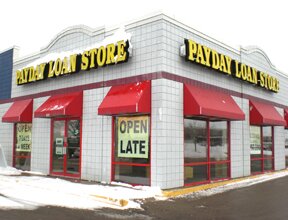Georgia Payday Loan Debate Heats Up
By Paul RizzoPayday Loan Writer
The Georgia General Assembly tried for decades to push payday lenders out of business. But the purveyors of short-term, high-interest payday loans always found a way to survive.
That changed three years ago, when commanders at Georgia’s military bases launched an attack on payday lending and the General Assembly responded by shuttering the multimillion-dollar industry, which advances cash until a worker’s next paycheck arrives.
Today, the General Assembly is in the midst of a fierce debate over legislation that would bring Georgia payday loans back.
 The state House is expected to take up a bill in the next week that would legalize the high-interest loans. House Bill 163, which has been gaining momentum in recent weeks, has been approved by the House Banks and Banking Committee.
The state House is expected to take up a bill in the next week that would legalize the high-interest loans. House Bill 163, which has been gaining momentum in recent weeks, has been approved by the House Banks and Banking Committee.
Backers say there’s a market for the online cash loans, but the industry is strongly opposed by consumer advocates. Atlanta’s Clark Howard, the consumer guru who hosts a syndicated radio talk show, said he took two vacation days to testify against the bill at the Capitol.
“I’m just heartsick over this,” Howard said in an interview. “We in Georgia have been doing the right thing and now we’re about to do the wrong thing.”
The plan to bring back fast payday advance lending prompted emotional debates in committee hearings. It pitted two of the state’s top Republicans against one another. It also created waves among members of the state’s Black Caucus when the group’s chairman signed on in support of the bill.
The bill’s sponsor, Rep. Steve Tumlin (R-Marietta), seemed battle-weary this week. Tumlin has said that he introduced the bill at the request of the payday lending industry and believes the issue deserves consideration.
“Sometimes you take a job and you just have to finish it,” Tumlin said. “I have had bills that just felt good from day one to the day it’s complete. This one has been more of a job than a joy.”
Sky-high interest rates
Easy payday loan lending is legal and regulated in 37 states. In Georgia and 12 other states it’s either illegal or not feasible under the law, according to the Community Financial Services Association of America.
Tumlin’s bill would allow payday lenders to charge a fee of $15 for every $100 advanced. Customers would write a post-dated check for the amount of the loan plus fees, in exchange for cash. The loan would be due whenever their next paycheck arrives.

 ”This is a public relations act from an industry under heavy fire,” says Jean Ann Fox, director of consumer protection for the Consumer Federation of America. ”This is a move to derail state and congressional legislation.”
”This is a public relations act from an industry under heavy fire,” says Jean Ann Fox, director of consumer protection for the Consumer Federation of America. ”This is a move to derail state and congressional legislation.” Advocates of increased regulation of the payday lending industry frequently point out that, annualized, the interest rates on these loans frequently runs high into the triple-digits. The Consumer Federation of America reports that the average annual interest rate on these
Advocates of increased regulation of the payday lending industry frequently point out that, annualized, the interest rates on these loans frequently runs high into the triple-digits. The Consumer Federation of America reports that the average annual interest rate on these  Below is the transcript of the letter Mr. Innis (pictured) wrote:
Below is the transcript of the letter Mr. Innis (pictured) wrote:
 “They’ll basically lend money to almost anybody, which means that it’s a very risky kind of loan,” Grunloh said.
“They’ll basically lend money to almost anybody, which means that it’s a very risky kind of loan,” Grunloh said.
 “This is a public-relations act from an industry under heavy fire,” says Jean Ann Fox, director of consumer protection for the Consumer Federation of America.
“This is a public-relations act from an industry under heavy fire,” says Jean Ann Fox, director of consumer protection for the Consumer Federation of America. The controversy centers on the misunderstood annual percentage rate (APR), which is irrelevant when applied to anything less than an annual rate. APR is designed to compare transactions from one year to the next; that is, a 7.5 percent APR remains constant whether it is over 10 years, 20 years or 50 years. Quoting a 365-day rate for a 14-day transaction creates an erratic number that has no effect on the dollar cost of the loan.
The controversy centers on the misunderstood annual percentage rate (APR), which is irrelevant when applied to anything less than an annual rate. APR is designed to compare transactions from one year to the next; that is, a 7.5 percent APR remains constant whether it is over 10 years, 20 years or 50 years. Quoting a 365-day rate for a 14-day transaction creates an erratic number that has no effect on the dollar cost of the loan.